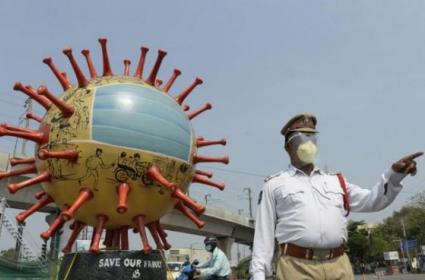COVID-19 Cases May Peak Between June 21-28: Study

India may witness COVID-19 cases peaking between June 21 and 28, a study by researchers at WB's Jadavpur university finds.
Maximum daily positive cases to be around 7,000-7,500 in this period
From the second week of July, a downward trend of confirmed cases is likely, the study predicted.
KOLKATA: India may witness COVID-19 cases peak between June 21 and 28 with maximum daily positive cases to be around 7,000-7,500 in thi period, a study by researchers at West Bengal's premiere Jadavpur University found out.
The study predicted that confirmed cases reported daily will show a rising graph till the end of June. From the second week of July, a downward trend of confirmed coronavirus cases is likely, it further predicted.
"A clear downward trend in the confirmed cases is likely to be observed each day from the second week of July," Nandadulal Bairagi, a senior professor of Jadavpur University who was involved in the project was quoted saying to a news agency.
The study was conducted by Bairagi, Professor and Coordinator Centre for Mathematical Biology and Ecology (CMBE), Jadavpur University, and five other researchers.
The study, based on a mathematical model approved by the Science and Engineering Research Board (SERB) of the Government of India, used deep machine learning algorithms along with a mathematical model for analysing and forecasting the COVID-19 pandemic in India with data being taken from the covid19india.org state website, the agency reported.
One of the factors for this high number could be a large number of asymptomatic persons roaming around with each having the potential to transmit the infection to two-three more persons.
"Just think of it. The contamination was contained after 76 days of lockdown in Wuhan, the origin point of the coronavirus pandemic. But we in India are witnessing a spike in active cases despite the lockdown nearing two months in few days time," he said.
In the absence of any specific drug and vaccine, India must continue its nationwide lockdown to prevent person-to-person transmission of coronavirus while looking for ways to start economic activities, the senior researcher said.
"Public transport must be avoided due to difficulties in contact tracing, random testing has to be increased and time for diagnosis has to be reduced for early detection...."
"We have recommended to the government that lockdown may be partially withdrawn in green and orange zones after the last week of June, but it must be continued in red-zone regions of the states concerned. Strict surveillance must be continued after partial withdrawal of lockdown to avoid the second wave of COVID-19," he said.
Asked about their observation on difficulty in contact tracing in case of contamination in public transport, he explained, "In a hospital or similar place where the persons who have contacted the infection can be traced, you can trace the origin and quarantine every body else who came in touch with the primary contact."
But in a bus or train, there can be many asymptomatic persons who will spread the infection and then get down at their stoppages, he said.
Apart from Bairagi, CMBE researcher Abhijit Majumder, Dr. Debadatta Adak of MBB University, Agartala, Dr. Tapas Kumar Bala of Department of Oral and Maxillofacial Surgery, Kusumdevi Sundarlal Dugar Jain Dental College and Hospital, Dr Abhijit Paul and Dr Samrat Chatterjee of Translational Health Science and Technology Institute, Faridabad were involved in the research.
The interim report of the research has already been sent to the SERB, he said.
(Inputs from PTI)
Also Read | COVID-19: 6,339 New cases In India, Death Count Rises By 140 In A Day




















